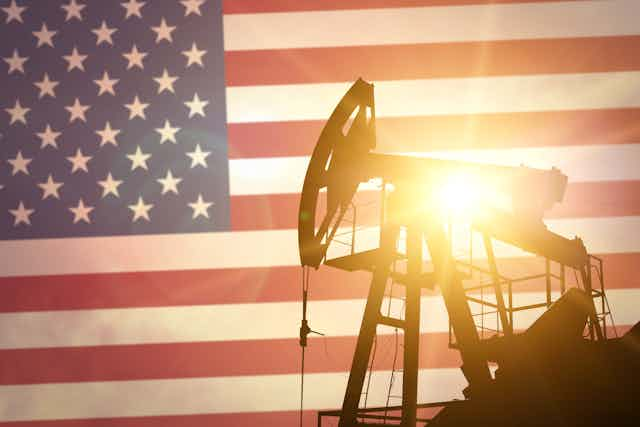As the climate crisis grows ever more urgent, fossil fuels are becoming an increasingly unattractive proposition. For the US, which is doubling down on its natural gas infrastructure, that’s a problem. The country wants to increase exports of its home-brewed gas. What better way than to rebrand it as the “freedom gas” and “molecules of US freedom” that uphold the country’s commitment to clean energy? Right?
The Trump White House’s weaponising of words has won his administration many linguistic battles. And in terms of attracting attention, this latest generous wordplay has certainly worked a charm. An otherwise humdrum announcement of the expansion of a natural gas plant in Texas has now made international news. But when the headlines have blown away, this liberty-tinged marketing ploy is likely to fall flat.
Marketing is, in a nutshell, the manipulation of consumers. Purchase that experience and you will seem like a more interesting person. Buy this gas and you’ll be supporting freedom. In a fossil fuel market recently dominated by countries with questionable reputations on human rights, perhaps the US Department of Energy’s announcement aimed to raise awareness among prospective foreign buyers that oil and gas made in the land of freedom and opportunity is now a considerable market force. Russia and the US are currently battling over Europe’s gas market, and civil liberties are not exactly the former’s USP within the region.
The rebranding is also a timely reminder of the US’s continued economic clout and geo-political power. This gas is explicitly for allies, at a time when trade tensions with China are pushing businesses and nations to choose sides.
But marketing only succeeds if it is not too obvious. Subtle “freedom gas” is not.
Funnily enough, people don’t like to think that they are being manipulated. We know magic shows are smoke and mirrors, but with skillful sleight of hand and hidden contraptions, a magician can suspend our disbelief and sell us a good time. The same is true of marketing. A car advert overtly selling the freedom of the open road would be likely to cause little other than ire in consumers who know full well that most of their time will be spent in traffic or driving to the supermarket. Instead, subtle but consistent scenes of picturesque mountain roads and country lanes slowly associate the emotions of freedom with the car that manufacturers want us to buy.
Many potential buyers will find the gaseous aroma of American liberty particularly pungent. To those with a dim view of the country’s consistent overseas interference, the rebranding will whiff of the worst of American hubris. China, for example, is turning to Qatar – a major competitor to the US – for sizeable new natural gas imports that are forecast to be big business. In the context of the escalating US-China trade war, such language is especially unlikely to bring the US further custom.
Domestic favour
Perhaps, then, this is an emotional appeal to a domestic audience, in homage to the “freedom fries” that marketised support for the invasion of Iraq against the backdrop of France’s opposition. Like US intervention, climate breakdown is certainly a polarising issue for the US electorate. Republicans are far less likely to care about the climate crisis than the US population overall.
Read more: Methane is a potent pollutant – let's keep it out of the atmosphere
But while molecules of freedom might appeal to a loyal voter base, the Trump administration would do well not to overestimate its size when playing with climate rhetoric. Concern over the climate crisis has never been higher, and even a majority of Republicans now support action on climate change. Only half of them support drilling for oil in the Alaskan arctic.
It’s worth remembering that the Frenchness of fries was quietly reinstated after it became clear that support for the Iraq war had dwindled and that most people thought the rebranding was “silly”. The freedom of future generations to enjoy a climatically stable planet is now a mainstream concern, as demonstrated by the chorus of sarcastic reaction to freedom molecules on social media.
The attempt to dress up natural gas as a clean energy source – a claim that the evidence does not support – may be a nod to the increasingly unavoidable reality of the climate emergency. But history teaches us that making misleading claims can be highly damaging to a brand.
In 1970, a time when US concern over air pollution was high, Standard Oil introduced a new premium petrol in California that was claimed to reduce emissions. Initially, it took off. But when emissions claims were later rejected as false, customers felt betrayed and the brand rapidly fell from favour. The misleading claims leading up to the 2003 invasion of oil-rich Iraq have tarnished a swathe of US politicians and tarred relationships with allies ever since.
The climate crisis will only become more urgent. Attempts to dress up environmentally damaging products as clean are highly likely to come back to haunt future politicians with similar ideologies. Rather than helping US Republicans to “spread freedom gas throughout the world”, provocative marketing ploys like this one may leave the party’s domestic and global influence evaporating as quickly as the fuel it sells.

